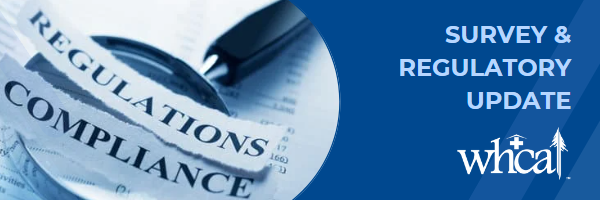The American Health Care Association/National Center for Assisted Living (AHCA/NCAL) has hosted a long-standing opportunity for WHCA member skilled nursing and assisted living providers to...
Read More
Every assisted living facility must disclose the scope of care and services it offers. This information must be completed on the Department of Social and Health...
Read More
Resident contact information, along with aggregate data on residents’ care needs, must be made available to various agencies upon request. This article aims to clarify what...
Read More
RN delegation in Washington’s assisted living facilities has been around since 1996; while aspects of the regulations surrounding delegation have evolved over the years to...
Read More
Imagine yourself in your own home, reading or watching TV. Someone you’ve known for years – or maybe, instead, a new acquaintance you met just last...
Read More
The ombuds program in Washington state is vital in holding up the rights of residents staying and living in assisted living and skilled nursing facilities....
Read More
Washington state is known for its robust advocacy channels for residents living or staying in long term care (LTC) facilities, including assisted living and skilled...
Read More
We encourage members who have experienced a recent survey or inspection who are interested in sharing their thoughts and ideas on the survey process to complete our quick informational Survey on Surveys.
Read More
WHCA and Residential Care Services (RCS) headquarters staff recently met to discuss issues regarding recent assisted living facility members’ inspections. Of concern during this meeting...
Read More
Residents who smoke require careful consideration to promote safe habits while honoring Washington state’s smoking laws. Even if your building is a “no smoking” facility,...
Read More
Receiving a Statement of Deficiencies (SOD) report from Residential Care Services (RCS) can be a stressful time. To understand each component of a SOD,...
Read More
It is common for assisted living residents to leave the facility to attend community events, go out to a restaurant with friends or family, or...
Read More
Many assisted living facilities reserve several apartments for independent living residents, referred to in the assisted living regulations as “nonresident individuals.” The definition of a...
Read More
There are several different pathways to becoming a qualified assisted living administrator in Washington state. The regulations, though offered in a step-wise fashion based on...
Read More
Washington State Labor and Industries’ Division of Occupational Safety and Health (DOSH) has instituted a Local Emphasis Program (LEP) for enforcement that targets industrial hygiene...
Read More
Regulations on electronic monitoring were updated in January 2020, just before the COVID pandemic. Early in the pandemic, limits on visitation resulted in a number...
Read More
Assisted living residents will likely have outside health care service providers such as home health or hospice at some point during their stay in the...
Read More
Washington state was an early legalizer of both medical and recreational marijuana. The legalization of cannabis in the state prompted long term care providers to...
Read More
There are times when assisted living wellness staff experiences difficulties in obtaining residents’ necessary medications; there are various reasons for these difficulties and methods to address them.
Read More
Nurses are a relatively new addition to assisted living in Washington. In the early 2000s, it was rare to see a nurse working full-time in an...
Read More
Residents must be assessed for the level of staff assistance they need with medications. Some residents (and in many instances some medications) warrant different levels of...
Read More
The Department of Social and Health Services (DSHS) training unit and the Department of Health (DOH) worked diligently with stakeholders, including WHCA, throughout the pandemic...
Read More
While all assisted living residents receive preadmission and ongoing assessments, those with symptoms of dementia require the facility staff to do some additional data collection. This...
Read More
With the high average number of daily medications taken by residents in assisted living, medication error rates can be relatively high. Combine the high number of...
Read More
Pets can be a benefit to residents in assisted living; dogs and cats (and other animals) offer companionship and attention and can enhance the homelike...
Read More
WHAT IS MEDICATION ADMINISTRATION? Legally, medication administration, accomplished by either a licensed nurse or a qualified credentialed caregiver, is the only medication service level that...
Read More
This article was originally sent via an emailed Survey and Regulatory newsletter in March 2022. While still accurate, new updates have come from DSHS because...
Read More
Washington State’s continuing education (CE) requirements vary, depending on the person’s job title as well as which (if any) credential they hold. This article is written...
Read More
There seems to be ongoing confusion surrounding the intricacies of involuntarily discharging a resident. Clarity was attempted through this article, with cited rules and step-by-step instructions provided....
Read More
The list of top citations over the past quarter shows family assistance with medications or treatments peaking at #2, the highest this WAC section has...
Read More
A plan of correction (POC) is required for every WAC violation noted in a Statement of Deficiencies (SOD) report. WAC 388-78A-3152 states that, by signing the attestation...
Read More
Residential Care Services (RCS) holds the authority to impose enforcement remedies on an assisted living licensee. While the entire list of remedies is listed in WAC 388-78A-3160,...
Read More
As part of the full inspection process, licensors will complete a full resident record review for each resident in the sample. While the record review is an important...
Read More
Facility inspections include resident group meetings, conducted by your licensor. These meetings are ideally held relatively early in the full inspection process. This allows the licensors...
Read More
33Issuing a discharge notice to a resident and his/her surrogate decision maker is never an easy task. Not only is it emotionally difficult for all...
Read More
Many administrators and other assisted living leaders have entered the workforce during COVID-19. Because the licensing inspections were on hold for over a year, it is...
Read More

